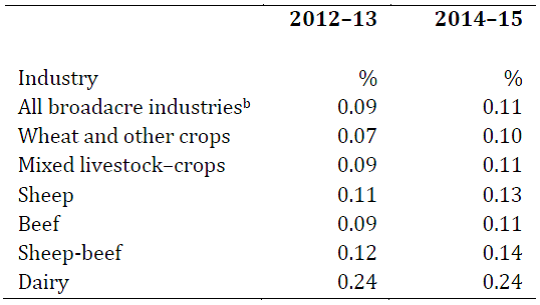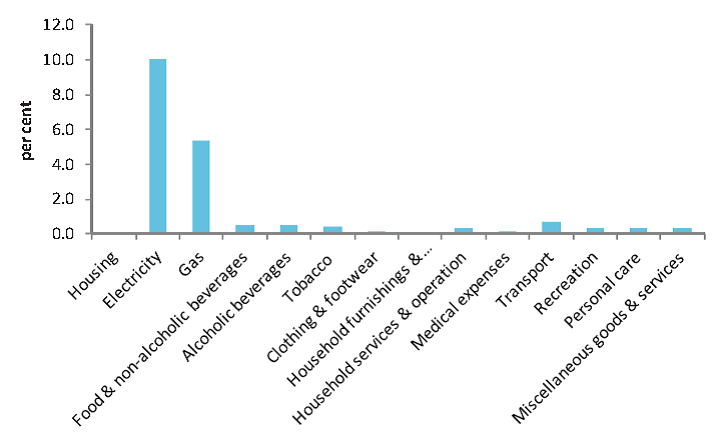Food prices and the carbon cost myth
Yesterday I highlighted that the Coalition’s carbon tax repeal bill specifically excludes the ACCC from ensuring we see price reductions at the supermarket checkout from the repeal of the carbon emissions trading scheme (Abbott's first broken promise, October 12). Instead, the ACCC will only be tasked with ensuring price reductions flowing from carbon price repeal for electricity, gas and refrigerant gases.
Still, one might argue that energy is an input to just about everything in the economy, so this should ultimately end up flowing through to the prices of food on supermarket shelves. That is true but you’d be extremely lucky to notice any change.
The Australian Food and Grocery Council recently claimed in a submission to the government that its member businesses had been largely unable to pass on cost increases associated with the carbon price and therefore: "...there will not be an across the board reduction in food and grocery prices once the carbon tax is repealed."
One should always be sceptical of any claim made by an industry association to government. Nonetheless, there are good reasons to believe that this is accurate. One reason is that food processors have come under increased competitive pressure from overseas suppliers due to the rise in the Australian dollar.
But the most important reason is because the carbon price’s ultimate impact on food prices is tiny because energy represents a very small fraction of the cost involved in food supply.
Back in 2010, I wrote a piece explaining how the carbon price would have only a very small effect on food prices, but it’s worth revisiting.
On the farm
The Australian Bureau of Agricultural and Resource Economics periodically survey input costs for farmers. In a 2011 report, they provided the following table showing the proportion of costs taken up by energy-intensive inputs that would increase in cost due to carbon pricing. Fertilisers and chemicals were not expected to increase notably in price because of international competition.
Figure 1: Energy intensive inputs as percentage of farm total costs

Source: ABARES (2011)
Electricity prices were expected to increase by 9.5 per cent as a result of the 2014-15 carbon price of $25.40.
Freight costs were expected to increase by just 0.7 per cent and aerial services by 0.8 per cent. Why so low? Well, the carbon price is expected to increase freight fuel costs by about 5.1 per cent and aviation fuel by 6.7 per cent, but fuel is just a fraction of these sectors’ costs. For example, in relation to road transport, petroleum fuel represents just 10 per cent of direct input costs, quite surprisingly, while compensation of employees is much more important (at about 30 per cent).
The end result of the carbon price, according to ABARES, is an increase in farming costs of just 0.1 per cent to 0.24 per cent, as shown below.
Figure 2: Estimated increase in on-farm costs of carbon price in 2012-13 and 2014-15

At the factory
If we move from the farm to food processing, we can use ABS input-output tables (which provide breakdowns on the inputs each industry uses) to assess the significance of energy as a proportion of direct input costs. What this analysis reveals is that energy represents a pretty small proportion of food processing sectors’ overall costs.

Source: Australian Bureau of Statistics input-output tables.
Transport
In terms of transporting the food products, the Bureau of Transport and Regional Economics estimates that transport costs contribute from 5-6 per cent of grocery retail prices. As discussed earlier, ABARE expects transport costs to increase by just 0.7 per cent. So 0.7 per cent of 6 per cent equals 0.04 per cent impact on food products.
In the supermarket store
At the end of the chain, in retail shops, energy makes up only about 2 per cent of input costs. And all the other parts of the production chain’s costs have been steadily diluted by other mark-ups along the way.
So in making its way from the farmer to the store, food goes through a variety of steps in which energy prices have a relatively small impact on total costs. This is the case for most goods and services across the economy.
Of course, there are then indirect flow-on impacts because energy is an input to many other products used in supplying food products to supermarket shelves. But these don’t change the fundamental conclusion that energy costs are a small fraction of overall food prices.
Economic modelling by the CSIRO and AECOM took these indirect flow-on effects into account to estimate that the carbon price impact on food prices would be less than 0.5 per cent, as illustrated below.
Figure 4: Estimated price increases for different household goods and services, assuming full cost pass through (2012-13)

Source: CSIRO and AECOM (2011)
It’s interesting to note that since taking office, the Coalition is now almost entirely sticking to the estimates made by Treasury of how the carbon price would impact on the household budgets. These estimates show that the carbon price impact on non-energy product prices would be quite mild, and this has ultimately eventuated in the real world.
The fact that the repeal bill provides no provision for the ACCC to pursue companies for grocery price reductions from carbon price repeal, reflects the fact that the Coalition now accepts the reality that the carbon price is utterly immaterial to grocery prices.













